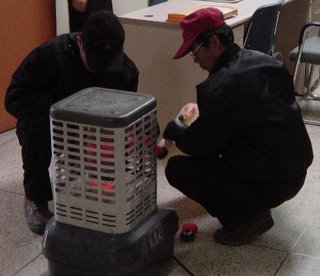For my third year class, however, the midterm exam was oral and students did not recieve the same questions. Taking an oral question and repeating it as a written question also seemed contraindicated; spelling would suddenly be a factor while it had not been a testable, and the grammar of conversation is at least a little different than written grammar.
Suddenly needing a new assignment, I asked the students to write about their six semesters of English at my university and also to add a few sentences about my class in particular. I told them I wanted advice on how to teach classes next year.
Although I specifically said I did not want, "I love KwandongBrian's class because..." type statements, I recieved a few. Gratifying and not completely useless: enough of them seemed sincere and indicated my current style and content are satisfactory, at least.
1) I also recieved responses that were clearly done with babelfish or another online translator. Here is a sample:
First time studying, it enjoyed a game all togather and the study which participates listen to person But study listen to old the time look in class appears to be being exchanged not togather.
This was handwritten and I blame the grammar on the translator and the spelling and punctuation on the transcription.
I think the fact that the student used a translator (for the second time) tells me something about my teaching but the criticism I draw from the response itself is something like, "I enjoyed the group activities at the beginning of the semester but later in the semester we students were more distant, separated by major". Certainly, I did more group activities in the first few classes and the rest of the classes were mostly spent with the students staying in their seats. The students self-segregated- they chose to sit in groups and with some distance between groups.
Next semester, I will be sure to add more activity to my classes. I join the students in prefering those classes and it was my lazyness in planning that resulted in more sedentary classes.
2) More than one student wanted "man to man" teaching. I do speak to almost every individual, every class and try to spend extended periods with different students each class but after reviewing the grammar, vocabulary and conversation models, and saving time at the end for whole-class demonstrations, I only have a few minutes to share with individuals and small groups. Still, I am interested in Sook-myoung University's (the bloggin'est university in Korea since Masuro from my university closed up shop) individual tutoring program. I think its called 'The Write Spot' or something and students can voluntarily visit for assistance with english.
Perhaps I need to require students come to my office for chats ouside of class time. I was going to put 'chat' in quotes because required speaking will never be as spontaneous as chatting should be, but requiring "private office time"(quotes deliberate) already sounds, um, possibly icky -quotes would only accentuate that.
3) One student wanted more content beyond or outside the textbook. I wil try this and it fits with my ideas for #4. On the other hand, university students seem worse at holding on to loose pages given them than elementary school students and their note taking ability is not much better.
4) More movies, video and music in class (and improve classroom facilities). Two different suggestions but the latter allows the former. My second year students (second year is a listening class, in which they watch 'Connect with english', a PBS ESL series) are not thrilled with watching video every class. Most of my 'sleeping students' photos come from these classes.
Still, there is good video content available now. I will show and discuss these videos with discussion about how they relate to class on the first day and give Kiwi! and others as homework. I will also continue to create my own content.
5) "Korean professors and Foreigner professor's teaching is insufficiency of connection." - This is true and a big subject for me to improve on. For second and third year classes, I teach one hour and a Korean teacher teaches one hour. Although we use the same basic material, I typically only exchange pleasantries with my co-teacher during the semester and my grades after the semester. I clearly need to communicate more with my co-teachers. In my defence, my co-teachers make little effort to contact me, either.
Students also need to evaluate their professors before recieving their grades but the evaluation is in Korean and also contains items that are beyond the control of teachers. I do not control which text is used, nor the duration of class nor the credit value for my classes. I think I have recieved some useful feedback here and hope to work on these things next year.











